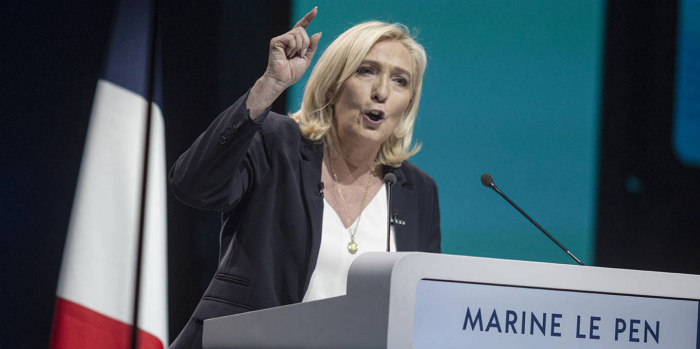If France and Germany falter because they cannot form stable governments around the political center, the European Union is almost certain to stagnate and become paralyzed. The far right's electoral gains threaten not just European democracy, but also its sovereignty and future prosperity.
After November 5, the world will know whether Americans have turned away from global leadership or decided to maintain it, along with their country’s commitment to longstanding alliances such as NATO. These are the stark alternatives represented by the isolationist Donald Trump and Vice President Kamala Harris, respectively.
But as the world fretfully watches the US election unfold, Europeans, in a sense, have already voted. Recent elections in the two largest European Union member states, France and Germany, were disheartening, to say the least, resulting in significant gains for the anti-Western, anti-European far right.
Although the far right was denied an outright parliamentary majority in both countries, its gains were too substantial to be ignored. Looking ahead, it will be more difficult in either country to form a stable majority of democratic forces, and thus easier for the far right eventually to gain power through electoral channels.
In France, after the political center’s demoralizing defeat in the June European elections, President Emmanuel Macron unexpectedly dissolved the National Assembly and called a snap election. But far from clarifying matters, this resulted in a hung parliament. Although an alliance of left-wing parties won the most seats, they fell far short of securing a majority.
For his part, Macron refused to cooperate with either the far left or with Marine Le Pen’s far-right National Rally, which had won the most seats in the European elections. With little other choice, he appointed a prime minister from the ranks of the Gaullist center-right Republicans, which has shrunk to a minor party in parliament. His choice, Michel Barnier, previously led the EU’s Brexit negotiations with the United Kingdom, and is seen as a steady hand. But, in fact, Macron has opened the door to indirect government participation by National Rally, by dint of Macron’s dependence on the party’s tacit support for Barnier.
A similar situation now looms in Germany, where state elections in Thuringia and Saxony also failed to produce majorities in the center. As a result, the only way to keep the far-right Alternative for Germany (AfD) out of state government is to include the newly formed Sahra Wagenknecht Alliance (BSW), a pro-Russia party whose main goal is to end the war in Ukraine by pursuing “peace” on Vladimir Putin’s terms.
Notwithstanding the center-left Social Democratic Party’s narrow victory in Brandenburg this past Sunday, Germany’s recent state elections bode ill for the federal elections next September. For now, the weakness of the democratic center in both France and Germany could effectively give Putin a seat at the cabinet table in both countries.
Of course, politically, France and Germany are not Hungary or Slovakia. But nor are Hungary and Slovakia as central to the future of the EU as France and Germany are. If the French and Germans falter because they cannot form a majority government of the center, the broader EU is almost certain to stagnate and become paralyzed in the face of Putin’s war of conquest. Worse, in a rapidly changing world order that is increasingly defined by great-power rivalries, Europe would effectively be pushed off the global stage.
In other words, Europe faces a triple threat – one that came into sharper focus following this year’s elections. Its democratic order is threatened by nationalism from within, violent revisionism from without, and the potential return of an American president who holds NATO (and the security it has delivered) in contempt.
Nationalism has been resurgent across Europe for at least a decade, having delivered its first big, dangerous result with the UK’s Brexit referendum in 2016. But the consequences of this revival continue to shock wherever they emerge. The significance of the far right making strong electoral gains in Germany cannot be overstated. Such developments are and will remain deeply debilitating for the EU as it navigates an increasingly challenging geopolitical environment.
A Europe that remains ideologically beholden to the era of nation-states will not be able to pursue further integration, which is necessary for preserving its sovereignty in today’s world. Nor will it be able to devise effective, coherent policies to manage issues such as immigration, even though Europe needs newcomers to address its demographic crisis. If Europeans continue to support neo-nationalist parties, they will undermine themselves.
Europe’s only chance in today’s dangerous world is to show strength through unity. The stronger that nationalist forces become, the weaker Europe will be.
Joschka Fischer, Germany’s foreign minister and vice chancellor from 1998 to 2005, was a leader of the German Green Party for almost 20 years.
More about:















































